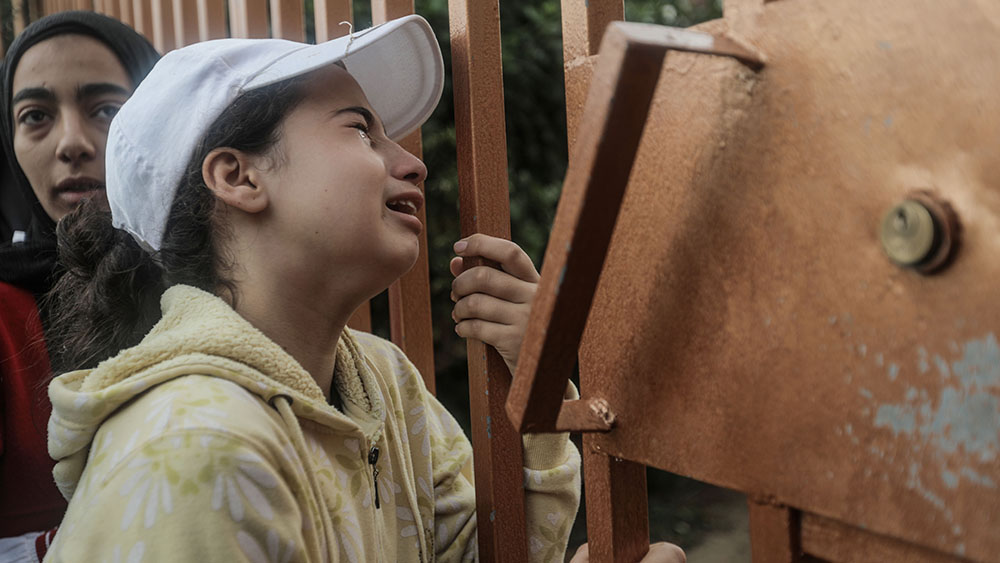 Parler
Parler Gab
Gab
Famine in Gaza manifests in the sight of people collapsing in the streets from sheer exhaustionAreas deemed "safe", such as northern Rafah or the Qataneh district, have turned into death zones. Starving civilians who head to these locations in search of aid are being targeted. According to the United Nations, Israeli forces have killed more than 1,000 Palestinians since late May while they were attempting to access food aid. Dozens continue to be killed each day. As former UN aid chief Martin Griffiths warned, this deliberate famine represents "the worst crime of the 21st century". Perhaps the most heart-wrenching image of all was that of the infant Yahya al-Najjar, just a few months old, who died of severe malnutrition. His tiny body was reduced to bones draped in translucent skin - a devastating sight, unfolding in full view of the world, in the heart of Palestine. Unbearable hunger We no longer speak of hunger in the abstract. Children now cry out daily: "We want bread!" "We want to eat!" But no one feeds them. My young cousins, only five years old, wake at dawn begging their father to bring them a loaf of bread, but he cannot afford one. A single loaf has become a luxury. Some fathers have begun to flee their tents, unable to bear the look of disappointment in their children's eyes. I saw a mother praying for her children to die, simply because she could no longer feed them. Some mothers sit at the entrances of their tents, tears falling, whispering broken prayers: "Oh God, please take them... relieve them of this suffering." In the streets, people can no longer walk. They drag their bodies. So extreme is the weakness that their legs can no longer support them. Faces are hollow, stripped of life. The children are skeletal. The men, pale and gaunt, haul their bones in heavy silence. I saw with my own eyes an elderly man, over 70 years old, ask a young man who was eating a piece of bread to share it with him. Has hunger brought us to the point where our elders must beg for a bite? Those of us who are married can no longer provide food for our wives. For months now, I have stopped entertaining the thought of having a child, not out of choice, but because this genocide has made it impossible to imagine a future for them. Each morning, my wife asks: "What do we have to eat?" And I answer, swallowing the shame of being unable to protect the person I love: "I'm fasting today." We fast out of despair, not piety. We drink water - when there is any - and deceive ourselves with hope, if only to survive the day. Invented meals Our daily meals are invented out of nothing: lentils mixed with pasta, rice cooked over a wood fire or soup made from nothing but boiled water. We eat, then feel hungry again an hour later. We sleep to escape the hunger, but it wakes up with us. During the day, we grow dizzy. We fall silent. We comfort one another with words. We nap, hoping the pain might ease. I have lost 14kg, and I am still fighting. But what of those with no job? No money? No one to lean on? In the street, under the blazing July sun, a child stares longingly at a vendor selling iced water. A cup costs half a dollar, but no one can afford it. There is no electricity, no fan, no shade - just thirst thick in the air. Someone walks by eating a sandwich, and five or 10 children, perhaps even elderly men, gather around, asking for a bite. It is not greed that drives them, but sheer desperation - because they are human, and hunger has taken everything else. The markets, where they still exist, are empty. Nasser Hospital, the last remaining lifeline in southern Gaza, has become a gathering point for those struggling to survive. There is no medicine or food - nothing but the screams of mothers, the tears of patients and those on the brink of starvation or death. Silent massacre Death no longer frightens anyone in Gaza. For many, it has become a dream. To be killed by shrapnel or an air strike is easier than dying while watching your children writhe in agony from hunger or your wife unable even to stand. Death is no longer the end; it is a release.
The world sees and hears, but does nothing, as if our lives are not worthy of livingWhat is happening in Gaza today is not a natural disaster. It is a deliberate famine - a massacre carried out in silence, as people waste away unseen. The population is being starved - slowly, cruelly, by design. At the same time, infrastructure is being destroyed. Hospitals are being bombed. Civilians are being killed as they crowd around aid lorries filled with flour, and the world watches from behind its screens, unmoved by any sense of humanity. This is Gaza now: a city untouched by light, inhabited by people waiting for the end. They do not ask for miracles, just some bread, some medicine and some dignity. The world sees and hears, but does nothing, as if our lives are not worthy of living. We do not write to weep, but to report the truth as it is: Gaza is choking from hunger, drowning in darkness and being annihilated in full view of the world. The views expressed in this article belong to the author and do not necessarily reflect the editorial policy of Middle East Eye. Read more at: MiddleEastEye.net
Gaza’s humanitarian crisis: The weaponization of starvation and the failure of international law
By Kevin Hughes // Share
Borrell slams EU’s complicity in Israeli war crimes, calls for action
By Zoey Sky // Share
FBI expands global reach with New Zealand office amid escalating surveillance concerns
By Finn Heartley // Share
Trump administration ties disaster aid to support for Israel
By Laura Harris // Share
Trump Admin Threatens to Withhold Federal Aid from Cities and States Boycotting Israeli Companies
By Finn Heartley // Share
Russia accuses U.K. of plotting attacks on Moscow’s “shadow fleet” oil tankers
By Zoey Sky // Share
Governments continue to obscure COVID-19 vaccine data amid rising concerns over excess deaths
By patricklewis // Share
Tech giant Microsoft backs EXTINCTION with its support of carbon capture programs
By ramontomeydw // Share
Germany to resume arms exports to Israel despite repeated ceasefire violations
By isabelle // Share










